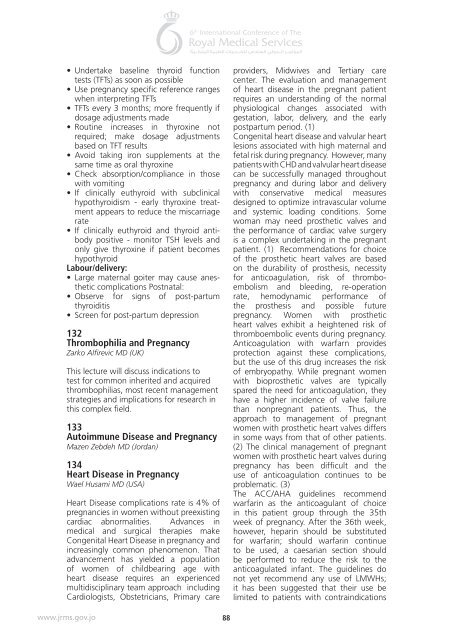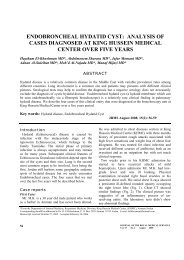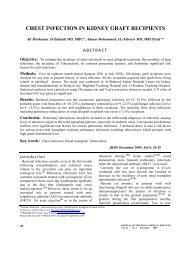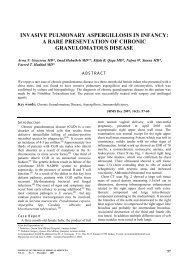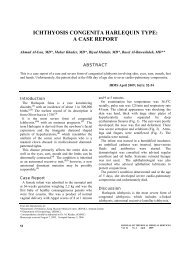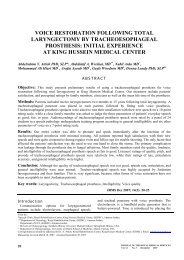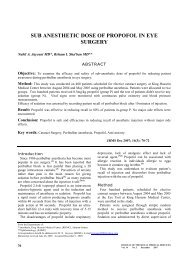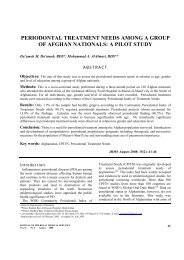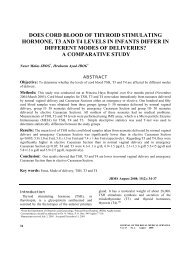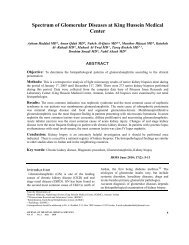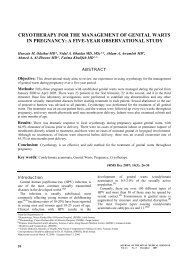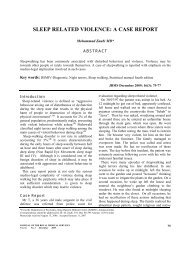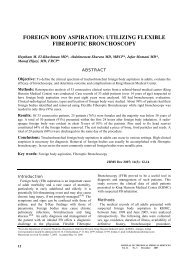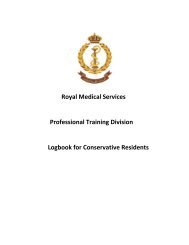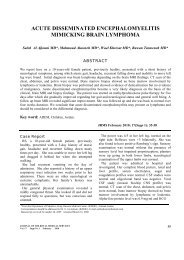Abstract book 6th RMS 16.indd
Abstract book 6th RMS 16.indd
Abstract book 6th RMS 16.indd
Create successful ePaper yourself
Turn your PDF publications into a flip-book with our unique Google optimized e-Paper software.
• Undertake baseline thyroid function<br />
tests (TFTs) as soon as possible<br />
• Use pregnancy specific reference ranges<br />
when interpreting TFTs<br />
• TFTs every 3 months; more frequently if<br />
dosage adjustments made<br />
• Routine increases in thyroxine not<br />
required; make dosage adjustments<br />
based on TFT results<br />
• Avoid taking iron supplements at the<br />
same time as oral thyroxine<br />
• Check absorption/compliance in those<br />
with vomiting<br />
• If clinically euthyroid with subclinical<br />
hypothyroidism - early thyroxine treatment<br />
appears to reduce the miscarriage<br />
rate<br />
• If clinically euthyroid and thyroid antibody<br />
positive - monitor TSH levels and<br />
only give thyroxine if patient becomes<br />
hypothyroid<br />
Labour/delivery:<br />
• Large maternal goiter may cause anesthetic<br />
complications Postnatal:<br />
• Observe for signs of post-partum<br />
thyroiditis<br />
• Screen for post-partum depression<br />
132<br />
Thrombophilia and Pregnancy<br />
Zarko Alfirevic MD (UK)<br />
This lecture will discuss indications to<br />
test for common inherited and acquired<br />
thrombophilias, most recent management<br />
strategies and implications for research in<br />
this complex field.<br />
133<br />
Autoimmune Disease and Pregnancy<br />
Mazen Zebdeh MD (Jordan)<br />
134<br />
Heart Disease in Pregnancy<br />
Wael Husami MD (USA)<br />
Heart Disease complications rate is 4% of<br />
pregnancies in women without preexisting<br />
cardiac abnormalities. Advances in<br />
medical and surgical therapies make<br />
Congenital Heart Disease in pregnancy and<br />
increasingly common phenomenon. That<br />
advancement has yielded a population<br />
of women of childbearing age with<br />
heart disease requires an experienced<br />
multidisciplinary team approach including<br />
Cardiologists, Obstetricians, Primary care<br />
providers, Midwives and Tertiary care<br />
center. The evaluation and management<br />
of heart disease in the pregnant patient<br />
requires an understanding of the normal<br />
physiological changes associated with<br />
gestation, labor, delivery, and the early<br />
postpartum period. (1)<br />
Congenital heart disease and valvular heart<br />
lesions associated with high maternal and<br />
fetal risk during pregnancy. However, many<br />
patients with CHD and valvular heart disease<br />
can be successfully managed throughout<br />
pregnancy and during labor and delivery<br />
with conservative medical measures<br />
designed to optimize intravascular volume<br />
and systemic loading conditions. Some<br />
woman may need prosthetic valves and<br />
the performance of cardiac valve surgery<br />
is a complex undertaking in the pregnant<br />
patient. (1) Recommendations for choice<br />
of the prosthetic heart valves are based<br />
on the durability of prosthesis, necessity<br />
for anticoagulation, risk of thromboembolism<br />
and bleeding, re-operation<br />
rate, hemodynamic performance of<br />
the prosthesis and possible future<br />
pregnancy. Women with prosthetic<br />
heart valves exhibit a heightened risk of<br />
thromboembolic events during pregnancy.<br />
Anticoagulation with warfarn provides<br />
protection against these complications,<br />
but the use of this drug increases the risk<br />
of embryopathy. While pregnant women<br />
with bioprosthetic valves are typically<br />
spared the need for anticoagulation, they<br />
have a higher incidence of valve failure<br />
than nonpregnant patients. Thus, the<br />
approach to management of pregnant<br />
women with prosthetic heart valves differs<br />
in some ways from that of other patients.<br />
(2) The clinical management of pregnant<br />
women with prosthetic heart valves during<br />
pregnancy has been difficult and the<br />
use of anticoagulation continues to be<br />
problematic. (3)<br />
The ACC/AHA guidelines recommend<br />
warfarin as the anticoagulant of choice<br />
in this patient group through the 35th<br />
week of pregnancy. After the 3<strong>6th</strong> week,<br />
however, heparin should be substituted<br />
for warfarin; should warfarin continue<br />
to be used, a caesarian section should<br />
be performed to reduce the risk to the<br />
anticoagulated infant. The guidelines do<br />
not yet recommend any use of LMWHs;<br />
it has been suggested that their use be<br />
limited to patients with contraindications<br />
www.jrms.gov.jo<br />
88


